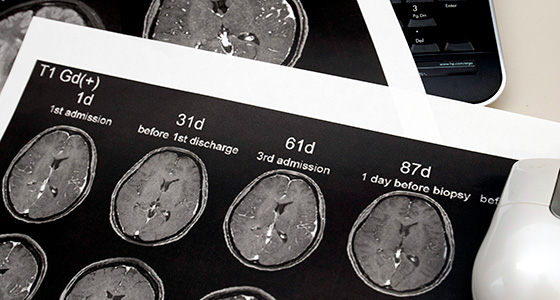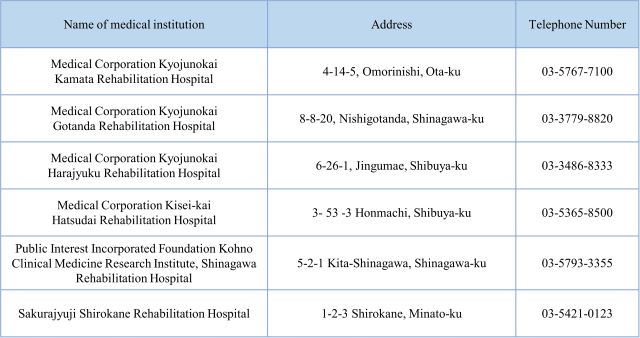- HOME
- Department
- Neurology
Neurology

Cerebrovascular Team
(1)Overview
As a core facility of the primary Stroke Care Unit
The Cerebrovascular Team mainly diagnoses stroke, provides medical treatment, and takes preventive measures. In particular, we focus on intravenous tissue plasminogen activator (t-PA) therapy (drip infusion therapy to dissolve blood clots) and endovascular therapy (treatment to recanalize the occluded vessel with a catheter) for the ultra-acute phase of cerebral infarction. We provide medical care in cooperation with Neurosurgery and Rehabilitation aiming at reducing the sequelae of stroke.
(2)Policy
Aiming at providing treatment one minute or even one second sooner
Cerebral infarction treatment is a fight against time. Treatment to recanalize cerebral blood vessels (intravenous t-PA or endovascular therapy) should be started as early as possible because it will lead to a better prognosis. In our department, we strive to ensure that these treatments can be started one minute or even one second sooner by cooperating with ambulance services and establishing an in-hospital treatment system.
(3)Characteristics
Treatment system to reduce sequelae of stroke
Stroke is a disease that may lead patients to need nursing care or become bedridden. In cerebral infarction, which is the most common type of stroke, brain tissues irreversibly necrotize, and consequently, many patients have sequelae. However, in recent years, it has become possible to reduce sequelae by recanalizing the occluded blood vessel in the early stage after onset.
For example, in Japan, intravenous t-PA therapy appeared in 2005, and thrombectomy catheters for cerebrovascular therapy appeared in 2010. These treatments are expected to improve the sequelae of patients with severe cerebral infarction who might have been bedridden before. Since an earlier start of intravenous t-PA therapy or endovascular therapy leads to improvement in the patients’ symptoms, we quickly provide these treatments in our department.
Practice of team care
In our hospital, Neurosurgery, Rehabilitation, nurses, physiotherapists, occupational therapists, speech therapists, and social workers work as a team to treat stroke in a comprehensive manner. All members gather at the conference every morning, exchange opinions, share information, and decide the treatment strategy.
Rehabilitation and discharge support
<pIn our hospital, rehabilitation intervention is started on the day of admission in early cases, aiming at the patients’ discharge and return to society. We basically aim at patients’ discharge, but some patients may be referred to a recovery-phase rehabilitation hospital where rehabilitation is conducted more intensively depending on the degree of sequelae or living background.
In the community, the Tokyo Jonan Stroke Network has been established, and the “Stroke Regional Linkage Treatment Plan (Stroke Linkage Pass)” is used as a tool to share patient information. Through this linkage pass, we are working to ensure smooth hospital transfer. As described above, we examine the treatment policy with multiple professions, explain it to the patients and their families, and then start using the pass. The following are the recovery-phase medical institutions cooperating with our hospital.

We have a contact desk for patients with stroke who are hospitalized or receive outpatient treatment at our hospital, as well as their families, to consult regarding various concerns, worries, and troubles.
Stroke Consultation Desk
Cerebral endovascular treatment
Brain surgery (carotid endarterectomy or cerebral aneurysm clipping) has been performed for carotid artery stenosis causing cerebral infarction or for cerebral aneurysm causing subarachnoid hemorrhage in the past. However, endovascular treatment (carotid artery stenting or cerebral aneurysm coil embolization) that is minimally invasive and has demonstrated safety and efficacy is now also available.
Our department will make the best efforts to provide optimal treatment or follow-up observation in consultation with the Neurosurgery department, patients, and the families. In addition, we perform intracranial/extracranial angioplasty of arteries and embolization of tumors in the head and neck.
Stroke Hotline
Our hospital operates the Stroke Hotline. In this system, our doctors directly receive calls from neighboring medical institutions and ambulance services 24 hours a day, 365 days a year, and accept patients smoothly. Our department is also available for emergency treatment of patients accepted by this Stroke Hotline.
For patients who visit the Cerebrovascular Team
It is important to treat the stroke quickly. For this reason, if you suddenly feel ill, please visit the hospital as soon as possible. Our department investigates the cause of symptoms suspected of stroke and provides treatment even if it is not emergency care. Moreover, we determine the policy for abnormality found in the brain dock, follow-up imaging of carotid artery stenosis, cerebral artery stenosis, cerebral aneurysm, etc., and conduct screening for arteriosclerosis and cerebrovascular disorder. Please consult us about anything related to neurological symptoms or cerebral blood vessels.
Since stroke often causes sequelae, prevention is important. We also manage risk factors such as hypertension, dyslipidemia, diabetes, atrial fibrillation, smoking, obesity, and heavy drinking and provide guidance.
Cranial Nerve Team
(1)Overview
The Cranial Nerve Team broadly handles diseases that cause defects in the brain, spinal cord, peripheral nerves, and muscles. We diagnose and treat a variety of diseases, from those that are common among relatively older people such as Alzheimer’s disease, Parkinson’s disease, and stroke, to those often occurring even in young people such as headache, epilepsy, encephalitis/meningitis, multiple sclerosis, myasthenia gravis, and peripheral neuropathy.
Particularly, intractable neurological disease is a representative disease that is difficult to diagnose and treat. Our department provides medical care to many patients with this disease.
(2)Policy
Cooperation with other departments to provide the necessary medical care
The Cranial Nerve Team provides medical care in cooperation with Neurosurgery and Rehabilitation. For example, if you are diagnosed with an acute stroke in our department, we will immediately refer you to the team that specializes in treating stroke in our hospital and begin providing treatment. It is not rare for patients who visit our department for dementia testing in the outpatient setting to have diseases needing brain surgery, such as chronic subdural hematoma and brain tumor. In this case, medical care can be promptly taken over by the Neurosurgery department of our hospital. As a result of such a cooperative medical care system, patients with various neurological diseases requiring specialized treatment visit our department.
(3)Characteristics
Role as a “contact desk” for suspected neurological diseases
Since the causes of diseases handled by Neurology are diverse, their diagnoses are often difficult. Many local general practitioners who could not identify the cause through medical examination have consulted us. Neurologists of our hospital try to identify the site of abnormality and clarify the patient’s disease through medical examination and various tests. Please consult with your primary care doctor first and ask the doctor to refer you to us.
Responding to the diagnosis and treatment of various intractable neurological diseases
Our hospital has been designated as a Tokyo Metropolitan intractable diseases cooperative hospital and focuses on early diagnosis and specialized treatment of designated intractable diseases. Moreover, Neurology actively diagnoses and treats intractable neurological diseases such as Parkinson’s disease, amyotrophic lateral sclerosis (ALS), and spinocerebellar degeneration.
Medical care for these diseases may require the cooperation of many people such as the patient’s family, persons involved in nursing care, and public administration, in addition to doctors, nurses, social workers, and rehabilitation staff. Our department provides treatment while coordinating them for each patient if necessary.
Responding to “immune neurological disorders” which are difficult to diagnose and treat
Our department also handles the diagnosis and treatment of immune neurological diseases. Immune neurological diseases are a general term for diseases caused by autoimmune reactions against the brain, spinal cord, and peripheral nerves. These include multiple sclerosis, Guillain-Barré syndrome, and chronic inflammatory demyelinating polyneuropathy (CIDP).
In recent years, new treatments for immune neurological diseases have been developed one after the other. We actively adopt them and provide medical care.
For patients who visit the Cranial Nerve Team
It may be difficult for patients to determine whether they should visit Neurology. In general, if you have any of the following symptoms, we recommend that you consult your primary care doctor about your symptoms.
- You have a headache.
- You have dizziness.
- You have numbness in your hands and feet.
- It is difficult to put force on your hands and feet.
- You have become poor at walking and prone to stumbling or falling.
- You move slowly or your hands tremble.
- You feel lightheaded.
- Memory loss is prominent.
- You sometimes lose consciousness.
- You have double vision.
- You have difficulty swallowing and easily choke.
Please consult with your primary care doctor first. If you need to visit Neurology, please visit us with a referral letter. If you visit our department for the first time, you will be asked about your symptoms using a medical questionnaire. After the examination, we may give you advice on the appropriate department according to your symptoms and findings.